Pursuing Kierkegaard
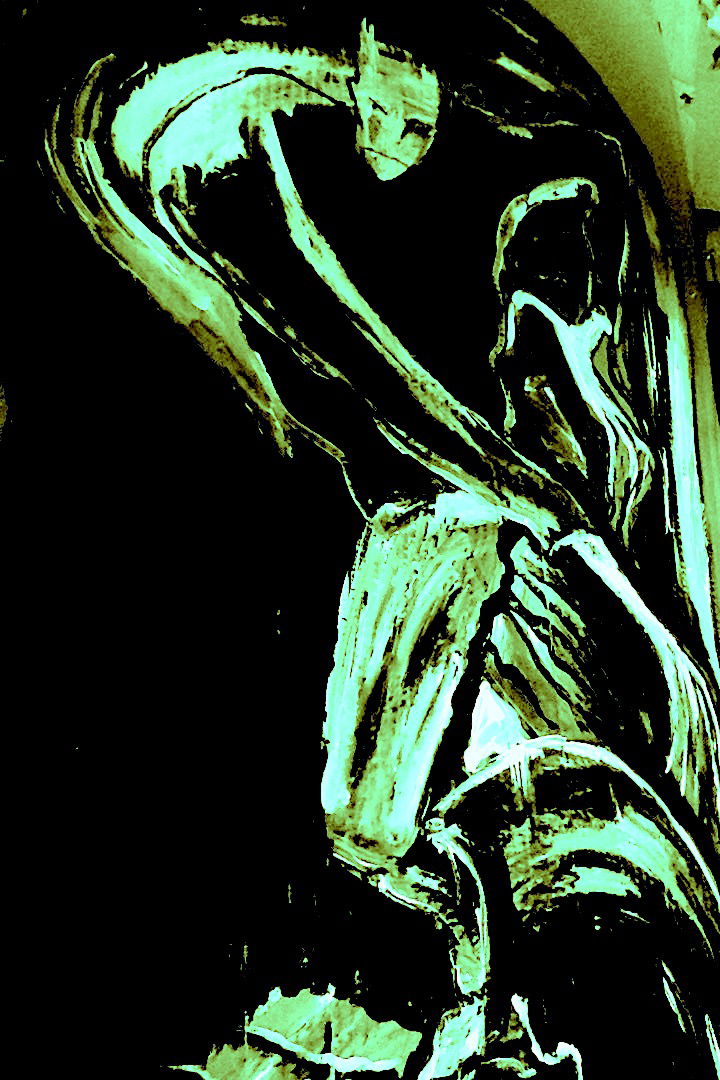
Interview by Richard Marshall.
(Film stills from Ozu's 'Tokyo Story' 1953)

'He argued that irony, especially as it arises in German Romanticism, was something that could be adequately discussed only in a contemporary language. At the same time, Kierkegaard was certainly well trained in the classical languages. He conducted the public defense of his dissertation in Latin (as was the norm then in Denmark)—a defense that lasted over seven hours!'
'I definitely disagree with Conant (and Allison for that matter) about the philosophical significance of what Climacus develops in the Postscript. It’s true that he does criticize and frequently make fun of Hegelian speculative philosophy, claiming, as Conant notes, that its practitioners are prone to a kind of absentmindedness and self-forgetfulness. But I think it’s wrong to assimilate Climacus’ own philosophical activity to the Hegelian manner of doing philosophy that is on the receiving end of many of his jokes. What Climacus does, rather, is to discuss (and enact) an alternative manner of doing philosophy, one which he associates closely with Socrates and which he thinks can be practiced without interfering with an individual’s ability to live an ethical or religious life. He characterizes this Socratic conception of philosophy as ‘that simpler philosophy, which is delivered by an existing individual for existing individuals’'
'A recurring theme in the Postscript is how, on Climacus’ view, ancient Greek philosophy (as exemplified by Socrates) is superior to modern philosophy (as exemplified by Hegel). One reason he seems to admire the former is because of its explicit concern with how a person lives. In doing philosophy as the ancient Greeks practiced it, the individual directs his or her attention to self-cultivation and to forming oneself into a particular kind of person. Or, as Climacus puts it, ‘in [ancient] Greece a thinker was not a stunted existing person who produced works of art, but he himself was an existing work of art’'

Paul Muench is a philosopher who writes about Nineteenth-Century Continental Philosophy, Ancient Philosophy, History of Analytic Philosophy, Philosophy of Literature and Film. Here he discusses Kierkegaard and irony, his Socratic approach, his discussion of Plato's Apology, his use of pseudonyms, Climacus, the hermeneutics of suspicion, his anti-philosophical style, whether Climacus is a Socratic figure, the issue of death, the issue of adopting a world historical perspective, 'mourning over oneself', riddling what he means by saying an individual is a human being in general and why his humour can still speak to the contemporary world.
3:16: What made you become a philosopher?
Paul Muench: I don’t know that I am a philosopher. The term ‘philosopher’ has rather grand connotations nowadays. It no longer means what it seems to have meant in its original Greek context: someone who loves and seeks wisdom (philosophos) as opposed to someone who is wise (sophos)—in other words, a student, not an authority. If Socrates were alive today, I suspect that he would leave the title ‘philosopher’ to others and might instead choose to call himself a philosophy student. That’s how I primarily think of myself, not as a philosopher or as a professor of philosophy, but as a philosophy student. So, if I may, I’d like to change your question to: ‘What made you become a philosophy student?’
One reason I became a philosophy student is that, growing up, I loved to think and entertain possibilities, and I loved to argue and have conversations with people. It was a real joy to discover there was a discipline that devoted itself to these things.
Another reason is because I was seeking a way to cope with anger. I grew up with a loving father who, at times, had an explosive temper. As a child, this terrified me. As an adolescent, I vowed I would find a way to protect myself from my father’s anger and to master, if possible, the intense anger that I sometimes felt within myself. (Those who know me will confirm that, when it comes to my own anger, this is an ongoing project!) I wanted to be a different kind of person, someone with greater self-control and less fear. I also wanted to become someone who knew how to love, both other people and myself. Without knowing it, I think what I most wanted and what I went looking for was a kind of wisdom, the kind that concerns how to live.
Over time, I learned that there have been others who have thought of philosophy in these terms, as a discipline by means of which an individual can gain greater self-understanding, self-development, and self-mastery. As both an undergraduate and a graduate student, I sought these thinkers out. I read a lot of Wittgenstein, discovered Aristotle’s Nicomachean Ethics, read Kierkegaard and Nietzsche, discovered Socrates (and so Plato), read Pierre Hadot’s Philosophy as a Way of Life, read more Kierkegaard, discovered the Stoics and Epicurus, read Martha Nussbaum and Cora Diamond on philosophy and literature, read Stanley Cavell on film, and rediscovered Thoreau. One day, to my surprise, I learned that the great Roman Stoic Seneca had actually written an entire treatise on anger (De Ira). It contained an analysis of anger and a series of arguments against competing conceptions, and, equally important to me, it had exercises for the reader, practical suggestions both for how to raise the young and for how to reform one’s own relationship to anger and the role that it plays in one’s life.
While studying philosophy, I’ve been fortunate to have many great teachers. Sometimes they pointed me to a book or an article. Sometimes they were patient with me when I didn’t complete my work on time. Sometimes they encouraged me. Sometimes they praised the work that I did complete. Sometimes they left me to myself when what I really needed was to figure something out on my own.
As a graduate student I developed a course called ‘The Art of Living.’ Teaching this course (first in graduate school at the University of Pittsburgh, then at Williams College, and then multiple times at the University of Montana) was my first experience of how truly enjoyable it can be to teach philosophy, something I was not initially sure I would like doing or be any good at. In this course my students and I discuss works by Plato, Aristotle, Epictetus, and Epicurus (among others), and the goal is not only to help students to gain an appreciation for the ancient Greek conception of philosophy as a way of living, but also to give my students opportunities to examine and test themselves, to try certain experiments in living to see what they discover about themselves and the ways they presently live their lives.
So I would say, then, that I became a philosophy student for all of these reasons: my love of thinking and conversing, my search for an art of living, my companionship with certain thinkers and their books, the interest taken in me by my teachers, and my own love of teaching. If being a philosophy student for all these years entitles me to call myself a philosopher, I would say that I am still far from embodying Thoreau’s ideal: ‘To be a philosopher is not merely to have subtle thoughts, nor even to found a school, but so to love wisdom as to live according to its dictates, a life of simplicity, independence, magnanimity, and trust. It is to solve some of the problems of life, not only theoretically, but practically’ (‘Economy,’ Walden).
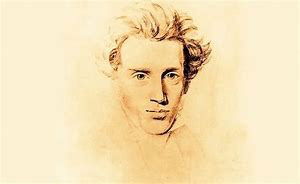 3:16: You’re an expert in Kierkegaard. You point to his links with Socrates as being important, in particular Kierkegaard’s view that Socrates was an ironist. He makes a distinction between irony as a figure of speech and irony as a standpoint. Can you say something about this and which he applied to Socrates?
3:16: You’re an expert in Kierkegaard. You point to his links with Socrates as being important, in particular Kierkegaard’s view that Socrates was an ironist. He makes a distinction between irony as a figure of speech and irony as a standpoint. Can you say something about this and which he applied to Socrates?
PM: Sure. While Kierkegaard frequently celebrates Socrates’ use of irony as a rhetorical device, he also argues that Socrates’ very nature as a person is itself characterized by a pervasive irony, which is sometimes treated by Kierkegaard as a position or standpoint that Socrates adopts towards the world as a whole.
Kierkegaard draws the distinction between irony as a figure of speech and irony as a standpoint in his first major work, On the Concept of Irony. He submitted this to the philosophy faculty at the University of Copenhagen as his magister dissertation, which is roughly equivalent to a Ph.D. dissertation. After successfully petitioning the king, he was allowed to write his dissertation in Danish instead of the traditional Latin. He argued that irony, especially as it arises in German Romanticism, was something that could be adequately discussed only in a contemporary language. At the same time, Kierkegaard was certainly well trained in the classical languages. He conducted the public defense of his dissertation in Latin (as was the norm then in Denmark)—a defense that lasted over seven hours!
Kierkegaard was fascinated by Socrates his entire adult life. The subtitle of his dissertation is ‘with Continual Reference to Socrates.’ In many ways, Kierkegaard seems to have taken these words to heart. As his repeated nods to Socrates in his various writings reveal, Socrates was the standard against whom he measured himself, both as a philosopher and as a human being. Sometimes, as in his dissertation, he focuses on Socrates’ irony. In other writings he stresses Socrates’ significance as an ethical thinker and teacher: someone whose life exhibits a particular ethical character and who, as a kind of philosophical midwife, helps others to examine and develop themselves more fully. Kierkegaard is also struck by how the difficulties that Socrates faced near the end of his life had, in part, a religious character, how his being put to death by the Athenian state partly on theological grounds made him into a kind of martyr.
His most sustained discussion of Socrates and the closest thing he ever wrote to a scholarly work is his dissertation. He devotes about three quarters of this 300+ page book to addressing and, he contends, solving the Socratic Problem: who was the real, historical Socrates? Can the surviving texts from antiquity be reconciled, and if so, how? Kierkegaard argues that only when Socrates is conceived of as a thoroughgoing ironist can we make the most satisfying sense of the different literary portraits we have of him from antiquity, those found in Xenophon’s writings, Aristophanes’ comic play the Clouds, and of course Plato’s writings.
It’s as part of this argument that Kierkegaard introduces the distinction between irony as a figure of speech and irony as a standpoint. In simplest terms, irony as a figure of speech is what you’d expect: saying the opposite of what you mean, or saying something that is contrary or opposed in some way to what is meant. For Kierkegaard, the critical thing is that there is an opposition of some sort between what is said and what is meant. When we encounter words spoken with irony, we often don’t know what is meant. We may form the impression that there is more to what the speaker means than we can immediately make sense of. One of my favorite examples of irony of this sort occurs in the Japanese director Yasujiro Ozu’s great film Tokyo Story. There’s a scene where an elderly woman is staying the night with her daughter-in-law, Noriko (played by the wonderful Setsuko Hara). Her son died during the war and as they are preparing for bed, she remarks to Noriko, ‘What a treat to sleep in my dead son’s bed.’ In one sense she clearly doesn’t mean what she says, although when you watch the scene her words resonate on multiple levels: there’s both bitterness and tenderness involved.

Irony as a standpoint generalizes this oppositional pattern between what is said and what is meant. In this broader conception, everything expressed by a person, both words and deeds, may be opposed to that person’s ultimate conviction that nothing held to be valuable or meaningful by others actually has that particular value or meaning. Kierkegaard approvingly quotes Hegel in trying to explicate this notion of irony, calling it ‘infinite, absolute negativity.’ Irony thus conceived is a powerful, negating force whose scope is unlimited and which gets its power from what is actually true, which Hegel sometimes calls the absolute. In the case of the ironist, as Kierkegaard conceives him or her, the absolute appears in its most abstract, empty, diminished form as nothing. This makes the ironist a troubling, potentially nihilistic figure, but also gives him or her a great critical power. Within Hegel’s account of how human consciousness changes and develops over the course of world history, there are occasionally momentous turning points, in which one form of consciousness gives way to another. Kierkegaard argues (largely in agreement with Hegel) that Socrates was a world-historical figure who played an important role at one such turning point, someone who helped Athenian society to begin the transition from an outward-looking, communal conception of morality to one that is more inward-looking, anticipating a fuller kind of human freedom and human subjectivity, in which an individual consults not the community, but his or her own conscience when trying to determine the right thing to do.
It’s worth noting that scholars are divided about how seriously to take Kierkegaard’s argument in his dissertation. He frequently appeals to Hegel and employs a Hegelian world-historical framework as part of his discussion of Socrates and the concept of irony more generally. Some scholars have resisted the idea that Kierkegaard—who in later writings appears quite dismissive of Hegel and Danish Hegelian philosophy—could ever have been as sympathetic towards him as he appears to be in his dissertation. Could Kierkegaard’s apparent admiration for Hegel and his philosophical insights itself be a kind of irony? I would say no. I think Kierkegaard is best conceived of in this early work as someone who is trying to settle once and for all the Socratic Problem, and who is happy to draw on Hegel where this helps him to make his case.
3:16: How important is his discussion of Plato’s Apology for establishing that Socrates was an ironist?
PM: Very important indeed. For Kierkegaard, Plato’s Apology is in a class of its own. He claims that in this work we encounter a representation of Socrates that is historically true and in no way distorted by Plato’s own philosophical preoccupations. And he also claims, not without controversy, that Socrates’ irony is most clearly on display in this work. For Plato’s other writings, especially the so-called early Platonic dialogues that are thought by many scholars to track more closely the historical Socrates’ actual philosophical interests and methods (e.g., the Laches, the Charmides, the Protagoras, the Gorgias) or those works that contain helpful portraits of who Plato thought Socrates was (e.g., the midwife passage in the Theaetetus, Alcibiades’ speech in the Symposium, Socrates’ death scene in the Phaedo), Kierkegaard thinks readers are frequently faced with the interpretive challenge of having to distinguish between Platonic and Socratic elements. He thinks the Apology, on the other hand, is pure, unadulterated Socrates. Kierkegaard thus places a lot of weight on the Apology and appeals to it at several points in his argument. First, he draws on the Apology in his discussion of the different literary portraits of Socrates. He also appeals to the Apology (and to a lesser extent Xenophon’s Apology) when discussing what he takes to be established historical facts about Socrates: that he claimed to hear a divine voice (his daimonion), which frequently told him to stop doing something he was doing (or, in Xenophon’s case, also sometimes told him what to do), and that he was put on trial in Athens for religious unorthodoxy and for corrupting the youth. And, finally, he appeals to the Apology when discussing whether or not Socrates is properly conceived of as a world-historical figure, as Hegel and Kierkegaard both maintain.
3:16: Kierkegaard is well known for using pseudonyms. Is this approach part of Kierkegaard’s Socratic ironic approach?
PM: That’s a good question, and not an easy one to answer. Part of the difficulty is that Kierkegaard’s conception of a pseudonym evolves over several books. Before addressing how Kierkegaard’s use of pseudonyms can be tied to his larger Socratic project, let me briefly address the more basic question of what a pseudonym is in Kierkegaard’s writings.
When I first introduce my students to the idea of a Kierkegaardian pseudonym, the first thing I tell them is not to think of his pseudonyms as pen names or aliases under which Kierkegaard wrote. They are better seen as fictional or literary characters. Think of a character, for example, in one of Shakespeare’s plays or one of Plato’s dialogues. An author creates a character. That character has a name, a personality, perhaps an occupation. He or she has thoughts about various things, speaks in a distinctive voice, and typically should not be identified too closely with the author who has created him or her. What Hamlet thinks clearly isn’t what Shakespeare thinks, or if someone contends that they share a particular view about something, it would take some work to establish this. Kierkegaard sometimes calls his pseudonymous writings his aesthetic works. By this I think he simply means his literary, fictional works, the ones where his artistic genius is most in evidence. These are the works for which Kierkegaard is best known, and part of what makes them so are the different, sometimes quite engaging, literary characters we encounter when reading them.
Kierkegaard’s pseudonyms all have distinctive Latinate names: for example, Victor Eremita, Johannes de Silentio, Constantine Constantius, Vigilius Haufniensus, Frater Taciturnus, Johannes Climacus. The pseudonyms are generally well educated and highly cultured. They are notably well read in philosophy, including both ancient Greek and Roman works and the modern period beginning with Descartes. They are also all occupied in various ways with writing and publishing, which is why Kierkegaard sometimes refers to them not just as pseudonyms but as pseudonymous authors. Sometimes one pseudonym will edit the writings of several other pseudonyms. For example, in the book Either/Or Victor Eremita is the (fictional) editor of papers he claims to have found in a secret compartment in a writing desk he purchased at a used furniture store. One portion of the papers seems to have been written by an unnamed person, dubbed ‘A’ by Eremita. These papers are primarily aesthetic essays and include a fictional diary (called ‘The Seducer’s Diary’), narrated by yet another literary character (Johannes the Seducer). A second portion of the papers seems to have been written by someone named Judge William (also sometimes called ‘B’ by Eremita), who addresses what he writes on ethics and marriage to ‘A,’ his young friend and the pseudonymous author of the papers that make up the first part of Either/Or. In other cases a given pseudonym is both the (fictional) author of a work and its first-person narrator. Sometimes the pseudonyms engage in literary experiments within their texts, creating characters that help them to examine a given philosophical topic. This happens, for example, in the third part of Stages on Life’s Way: Frater Taciturnus’ work entitled ‘“Guilty?”/“Not Guilty?”: A Story of Suffering,’ whose subtitle is ‘A Psychological Experiment.’ Taciturnus explains the purpose of his experiment in a lengthy, nearly 100-page-long appendage to the main text entitled ‘Letter to the Reader.’ Sometimes pseudonyms may even use themselves in these experiments, adopting a role, presenting themselves differently in the body of the text than they appear elsewhere—in the preface or the conclusion or perhaps in an explanatory appendix or footnote (e.g., Constantine Constantius in Repetition). So when reading Kierkegaard’s pseudonymous works we often encounter a fictional character, typically the narrator of the work we are reading, who conceals for a time who he is and what he thinks. Later in the text he will usually provide an explanation for why he did this and also often reveal what he actually thinks about a given matter. It can get pretty complicated.
Kierkegaard published several books pseudonymously before he seems to have reflected much on the phenomenon of pseudonymity itself and what philosophical significance this has for what he calls, more generally, his authorship. In fact, I think the first place in Kierkegaard’s writings where the term ‘pseudonym’ is assigned any theoretical significance is in the Concluding Unscientific Postscript, which is itself a pseudonymous work. Johannes Climacus, its fictional author and narrator, provides his readers with a helpful overview of all of the previous pseudonymous writings and how he thinks they have played a role in his self-appointed task of investigating the relationship between modern Hegelian philosophy and Christianity, including specifically how the former may have been damaging to the latter. Prior to Climacus, other pseudonyms occasionally refer to each other’s writings, but they never to my knowledge employ the term ‘pseudonym.’
Kierkegaard’s best single discussion of what he takes a pseudonym to be and why he has used pseudonyms can be found in a short essay entitled ‘A First and Last Explanation,’ which he appended to the end of the Postscript in his own name. In this essay Kierkegaard describes himself as the author of the pseudonymous authors, as the one who has given each pseudonym his specific outlook or fundamental view of life. At the same time, though he describes himself as the creator of these fictional authors, he also insists that the words that appear within the pseudonymous works are not his words and should not, accordingly, be attributed to him. He not only claims that ‘in the pseudonymous books there is not a single word by [him],’ but he also says that if he ever were to allow himself to speak even one word in his own voice in the pseudonymous books, such an act of ‘self-forgetfulness’ would be ‘guilty of having essentially annihilated the pseudonyms by this one word’ (CUP1, 626; SKS7, 570). Kierkegaard does admit, however, that there are two important respects in which he remains responsible for what appears in the pseudonymous works. First, he is certainly legally responsible for anything that appears in them. He is the one, for example, whom you would sue for libel or defamation. And it is he who retains legal ownership of the works, receives royalties, etc. He also says that he is responsible for how well (or poorly) a given work is in fact written. That is, even though he asks readers to treat what is written as if it has been written by a given pseudonym, he admits that if the writing is deficient (e.g., boring, uninteresting, derivative, sentimental, etc.), then it is he who deserves the blame. On the other hand, when it comes to analyzing and interpreting a given pseudonymous work, Kierkegaard asks readers to treat its content, its literary form, its epigraph, the methods employed, the arguments put forward, etc., as all belonging to the pseudonymous author who (fictionally) has written it. And to those who plan to quote or cite one of his pseudonymous works, Kierkegaard requests that they please do him the kindness of attributing the work in question not to him but to its corresponding pseudonymous author.
I think there are two senses in which Kierkegaard’s use of pseudonyms can be tied to what might be called his larger Socratic project. The first is at the level of an individual pseudonym and a particular pseudonymous work. The pseudonyms themselves sometimes adopt Socratic stances towards their readers and I think particular pseudonymous works can have a Socratic effect on their readers. Kierkegaard encourages readers not to become overly interested in the personal details of his own life, whether he’s a Christian, whether he wears a hat when he takes a walk, etc., and in fact asks readers to remember him as ‘irrelevant to the [pseudonymous] books, as the [reading] relationship requires’ (CUP1, 629; SKS7, 572). Among his different pseudonyms, he singles out Climacus in particular as one who adopts a kind of Socratic stance towards his readers in the Postscript (PV, 43; SKS16, 25; PV, 8; SKS13, 14). In a world where people commonly think they know what Christianity is and where they imagine that they already are Christians, Climacus denies that he is a Christian and presents himself as someone who would like to know how he, Johannes Climacus, can become a Christian. In this way, like Socrates, he starts by granting both that his readers are knowledgeable about the very thing concerning which he has questions (Christianity), and that they are already leading lives that are informed by this knowledge. Such a stance and way of investigating a topic may provide an occasion for his readers to examine more closely whether they are in fact as knowledgeable as they initially imagine and whether they are actually leading the lives that they think they have been leading.
The second sense in which Kierkegaard’s use of pseudonyms is part of his larger Socratic project concerns how he thinks the pseudonymous works relate to writings that Kierkegaard published under his own name and that are more explicitly about the religious life and Christianity. Setting to one side his dissertation, Kierkegaard basically wrote three types of work: (1) his pseudonymous works; (2) works published under his own name that often read a bit like sermons (he calls these ‘edifying’ or ‘upbuilding’ discourses and insists that they are not sermons since he has no official sanction from the church to write or deliver sermons); and (3) writings that try to explain the significance of his other writings. The best-known example of this third type of work is called The Point of View for My Work as an Author. In it, Kierkegaard argues that his entire body of work, beginning with Either/Or, has an overarching religious aim: to reintroduce Christianity to the world of Christendom; to get people to consider what it truly means for an individual to become a Christian. He doesn’t, however, claim that he had this overarching aim from the beginning. Rather, he conceives of his activity as a writer and thinker as having partly served as an opportunity for his own education and self-development. Yet as he continues to write he comes to see all of his writings as being in the service of this larger religious aim. He thinks that while it is still common for people to conceive of themselves as Christians and to call themselves Christians, many are rarely if ever motivated to live a Christian life. That is, he thinks people are under a kind of illusion that they are Christians. To communicate this idea, however, is not something that Kierkegaard thinks can be done in a straightforward manner. If people are already invested in seeing themselves a certain way, he thinks they naturally will be quite unwilling to be told otherwise. So, Kierkegaard concludes, he will need to use indirect means. He will need to attract a readership and then, provided they keep reading, lead them from where he existentially finds them to where he thinks the most important issues reside. The role of attracting and building a readership is played by Kierkegaard’s pseudonymous works. Readers, unaware that they are not leading the Christian lives that they imagine they are leading, discover some rather interesting and unusual literary and philosophical writings. Kierkegaard’s hope is that those who are engaged enough by these writings that they are willing to read future installments will gradually be led towards the topic that he thinks they’ve been neglecting, the topic of what it means to be a Christian. In this way, Kierkegaard suggests that the pseudonymous books collectively may have a Socratic value in relation to his later, more explicitly religious books.

3:16: How would you summarize Kierkegaard’s Socratic point of view?
PM: I think that Kierkegaard saw himself as trying to help the citizens of nineteenth-century Copenhagen in much the same way as Socrates had helped the citizens of fifth-century Athens. He seems to have aimed his writings at a particular group of people who, under the illusion that they were leading Christian lives, had to be addressed in a specific manner so that they might overcome this illusion and change their lives accordingly. But while Kierkegaard held a lifelong interest in Socrates and selected his life as a model for his own, he also sometimes worried that relating to others as Socrates did might be incompatible with living an authentic Christian life. He worried that in playing the role of philosophical midwife for his fellow citizens, he himself might be sidestepping difficulties that every Christian must personally confront. If the Christian is to model his or her life after the life of Christ, then, Kierkegaard thought, doing this will include being open about the sort of life one is trying to live regardless of what others might think. In fact, he thought Christians should expect the world to reject what they believe (to find Christian beliefs absurd or ludicrous or perhaps even blasphemous) and, in many cases, to persecute them accordingly. Yet, in order to play the part of Socrates, he would sometimes have to be personally elusive, employing various forms of indirection to shine a light on others’ lives while keeping his own life an enigma. Withholding or concealing oneself is thus sometimes a Socratic requirement, while revealing or disclosing oneself seems to be an essential feature of an authentic Christian life. So I think Kierkegaard sometimes felt a tension within himself, between a Socratic part of his nature and that part of him that placed his trust in Christ.
It’s possible to view Kierkegaard’s body of writings in relation to this tension between the Socratic and the Christian. At times, Kierkegaard certainly seems to have thought that writing his pseudonymous books was a way of giving expression to his desire to create literature and to do philosophy, with the hope that one day he might be able to set these desires to one side so he could focus on more serious religious matters, perhaps become a rural pastor, perhaps turn his attention to the need for personal salvation. In fact, it became part of his regular practice that each time he would write and publish a pseudonymous work, he would also write and publish some edifying discourses, almost as if he had to pay a religious price for expressing himself through literature and philosophy. And eventually Kierkegaard does cease writing pseudonymous works and spends the last few years of his life writing about Christianity and the challenges it faces in the cultural situation of the nineteenth century.
So does this mean that Kierkegaard ultimately chose Christ over Socrates? Perhaps, but there is another document worth considering when reflecting on the extent to which Kierkegaard understood himself and his writings in terms of a Socratic point of view. Shortly before he died, Kierkegaard had begun publishing a kind of newspaper called The Moment. He had published nine issues and the tenth issue was in proofs when he died. In that tenth issue is a short essay called ‘My Task,’ in which Kierkegaard made one last attempt to explain what he thought the significance was of everything that he had written and everything else he had done in the service of his stated goal of reintroducing Christianity into Christendom (TM, 340-347; SKS13, 404-411). ‘My Task’ is the final example we have of the third type of work that Kierkegaard wrote, the type that seeks to explain the significance of his other writings. While it is not as detailed as the Point of View, it gains significance by being basically the last thing that Kierkegaard wrote before he died. In it, Kierkegaard makes two surprising claims. First, he asserts that the role he has played within Christianity is unique, that he stands alone within the entire Christian tradition. Second, he says there is only one precedent in human history for what he has done: the example of Socrates. It is Socrates and Socrates alone, he thinks, who provides a pattern that might help people to understand the significance of his life. In particular, he compares Socrates’ avowal that he is not a wise man to an avowal that he, Kierkegaard, makes of himself, namely that he is not a Christian. Indeed, he says that his entire body of writing has been stamped by the claim ‘I am not a Christian.’ This is quite puzzling and not, I suspect, how most readers of Kierkegaard would expect him to characterize himself and his body of work. Yet it is just this stance of humility that is the key point of comparison between himself and his model. Kierkegaard, like Socrates, in acknowledging his own limitations and failings, seeks indirectly to lead others to recognize theirs.
Kierkegaard had earlier created the pseudonym Johannes Climacus, who, if you recall, also denies that he is a Christian. One way to understand the significance of Climacus for Kierkegaard as a literary creation is that he gave his creator a way to express the Socratic side of his nature without personally requiring him to interact with his readers in such a way that he might end up having to sidestep the challenges of trying to live his life as a Christian. But Kierkegaard’s last words, what I think of as, so to speak, his deathbed confession, seem to suggest that he can’t or won’t give up the Socratic part of himself.
3:16: Climacus is a pseudonym Kierkegaard uses in two of his works, the Philosophical Fragments and the Postscript. In one he says he’s forgotten about Christianity and in the other he says he isn’t a Christian. So is there a way of profiling this character that isn’t contradictory?
PM: Definitely. To understand what Climacus is doing in his two books, it helps to remember what I said earlier, that Kierkegaard’s pseudonyms sometimes engage in literary experiments within their texts, and these experiments can involve a given pseudonym himself adopting a role that he will later step out of. Climacus claims that in an age in which most people think they are Christians and know what Christianity is, ‘it is only too easy to use the holy names without meaning anything thereby, to rattle off the Christian truth without having the least [personal] impression of it’ (CUP1, 283; SKS7, 258). His goal is to try to engage his readers and to help them realize that they may not be the Christians they think they are or be as knowledgeable about Christianity as they imagine. I’ve already briefly mentioned that in the Postscript the way that he does this is to present himself Socratically as someone who knows less than his readers, as someone who is not a Christian but who would personally like an answer to the question of how to become one. In Fragments, where he claims to have forgotten about Christianity, he employs a different strategy, initially presenting himself to his readers as someone with no awareness of Christianity whatsoever. He announces at the beginning of the first chapter (called ‘Thought-Project’) that he intends, through reflection and thought, to see if he can discover something that goes beyond a Socratic/Platonic conception of truth. It can look, at times, as though what he is trying to do is to engage in speculative philosophical reflection in an effort to discover something metaphysically new, but what he keeps discovering is, as he puts it later in the Postscript, ‘old-fashioned [Christian] orthodoxy in its rightful severity’ (CUP1, 275; SKS7, 250). That is, the only thing he seems capable of discovering using the methods of modern speculative philosophy is not something new at all, but the traditional Christian teaching. This, he also notes in the Postcript, is part of what makes his experiment in Fragments a kind of ‘parody of speculative thought’ and a ‘satire’ on its capabilities. At the end of Fragments he stops performing this role and shares with his readers that what he has been doing in the body of the book was something that he did deliberately, that he wanted in effect to forget about Christianity for a time, proceeding in his experiment as if he had never heard of Christianity. Once you come to see that much of what Climacus says and does is done while he is in character, and that he plays different roles in Fragments and the Postscript, then it becomes easier to view him, as I do, as someone who is perfectly consistent across his two books.
3:16: Climacus in the Postscriptis read by James Conant in a way that you say fosters a hermeneutics of suspicion. Can you first sketch what the Climacus character does in the work?
PM: Well, I’d be happy to try. Climacus actually does quite a few things in this book. At 600+ pages, the Postscript is one of Kierkegaard’s longest and, in my view, most philosophically rich works. When Kierkegaard wrote the Postscript, this was one of the times in his life when he seriously considered giving up writing entirely. The plan was to write one last pseudonymous book and then retire to the country to be a rural pastor. And the Postscript does sometimes read as if Kierkegaard tried to put everything in it that he had ever wanted to say. Its full title is Concluding Unscientific Postscript to Philosophical Fragments: A Mimical-Pathetical-Dialectical Compilation, An Existential Contribution. As a postscript to Climacus’ first book, it is rather unusual given that it is almost six times as long as the original work. Climacus characterizes it as a kind of sequel to Fragments and says he plans to investigate in this second book the same topic, Christianity, that he investigated in his first book, but he also says that how he goes about things will be different, involving what he calls a ‘new approach’ (CUP1, 17; SKS7, 26). I would say that Fragments and the Postscript differ importantly in terms of both scope and method.
Fragments is an elegant book. Climacus’ main goal is to develop a contrast between two conceptions of truth (a Socratic/Platonic conception and a Christian conception), examining in the process in each case what it is to be a teacher and what it is to be a student or follower. The main argument of the book takes issue with a view famously defended by Gotthold Lessing (in ‘On the Proof of the Spirit and the Power’). Lessing held that unlike the first-hand experience of people who lived at the time of Christ, the second-hand testimony that is available to later generations does not provide adequate evidence for religious belief. Against Lessing, Climacus argues that neither first-hand experience nor second-hand testimony provides adequate evidence for religious belief, but he also claims that this is not a problem since religious belief as he conceives it is not based on evidence. He suggests that it is better conceived of as a kind of gift that the one who believes receives from the deity. The other significant thing that readers learn in Fragments is that Climacus admires Socrates more than any other philosopher and thinks that his way of relating to others as a philosophical midwife is the highest relation that one person can bear to another person. He concludes Fragments by acknowledging that what he’d like more than anything would be for Socrates to inspect him and the quality of the philosophical work that he’s done in this book.
In the Postscript, by contrast, there is so much going on that it is difficult to provide an overview. Here are just some of the things that Climacus does in this multifaceted work:
1. Explains why he’s glad that his first book, Philosophical Fragments, was not a huge literary success;
2. Continues to discuss and refine several of the topics he investigated in Fragments, including admitting that Lessing—who was not mentioned by name in Fragments—was the principal stimulus that led him to develop the main argument in his first book;
3. Distinguishes between aesthetic capacities, which concern objects, and ethical and religious capacities, which concern subjects, leading him to distinguish between what he calls objective questions and subjective questions (the former being historical or metaphysical questions that are properly raised in a disinterested manner, while the latter are ethical or religious questions that personally pertain to the subject/person who raises them, and so are properly raised in the first person in an interested manner), which leads him to distinguish further between objective truth and subjective truth, and objective thinking and subjective thinking;
4. Celebrates Lessing as a kind of Socratic thinker who knows how to remain personally elusive;
5. Introduces a type of philosopher called a subjective thinker whose practice of philosophy is not incompatible with leading an ethical or religious life, someone he contrasts with the more prevalent, Hegelian type of philosopher whose manner of doing philosophy leads, he alleges, to a condition of absentmindedness and self-forgetfulness;
6. Develops a theory of communication, distinguishing between direct communication and indirect/artistic communication;
7. Celebrates Socrates and builds on the portrait of him as philosophical midwife that he presented in Fragments;
8. Argues that the chief Christian teaching—that God became a human being at a specific historical moment—is inherently paradoxical, is what he calls the Absolute Paradox, which some—who have faith—believe, while others respond either by taking religious offense or by finding this idea ludicrous and contradictory in nature, while still others—the dispassionate, disinterested practitioners of Hegelian speculative philosophy—neither passionately embrace nor passionately reject this paradox;
9. Explains more about himself and the events that led him to become a writer, including why he thinks he—Climacus—needs to use indirect communication and how he decided (in response to those who try to make things spiritually easier and easier) to try to make it more difficult to become a Christian, without, however, making it ‘more difficult than it is’ (CUP1, 383; SKS7, 349);
10. Provides a detailed overview of all of the previous pseudonymous works and how he thinks they relate to Fragments;
11. Responds to a review of Fragments that he thinks is fundamentally misleading;
12. Calls himself a humorist and distinguishes five types of individual which he ranks in terms of how existentially developed they are as subjects or persons: the aesthete, the ironist, the ethical person, the humorist, the religious person;
13. Further distinguishes between two types of religious person, calling their respective forms of religion ‘Religiousness A’ and ‘Religiousness B’ (the latter being Christianity);
14. Ends the Postscript, after investigating these topics for several hundred pages, with an appendix, entitled ‘An Understanding with the Reader,’ in which he revokes everything that he’s developed and argued for.
Methodologically, when Climacus says he will employ a new approach in the Postscript, he means primarily that he will not repeat the same literary experiment that he performed in Fragments. Recall that in Fragments Climacus presents himself in the experimental portion of the book as someone who apparently has never heard of Christianity; later he describes his experimental condition as one in which it is as though he has forgotten about Christianity. While he is in this condition of forgetfulness, however, and as he engages in his speculative reflections, what he keeps discovering is oddly reminiscent of the traditional Christian teaching, so much so that the imagined interlocutor with whom he has conversations in Fragments (usually at the end of a given chapter) repeatedly accuses him of plagiarizing the Bible. In the Postscript Climacus engages in a very different kind of experiment. Here he openly and from the outset refers to Christianity by name and declares that his aim will be to investigate (using himself, as he puts it, in an experimental manner) the question, ‘How do I, Johannes Climacus, become a Christian?’ He acknowledges that this might seem like a rather strange question for someone to ask in an age when most people assume that they already are Christians and that they already know what Christianity is. Nevertheless, he says he will (experimentally) ask this question, posing it in the first person. It is this stance of Climacus’ and this way of investigating the topic of Christianity that in the Point of View Kierkegaard treats as a Socratic way of proceeding, and which is also akin to the approach that in ‘My Task’ he compares to how Socrates comported himself in Athens and which he says he himself has pursued over the course of his authorship. And it is, furthermore, this very project—seeking to understand how to become a Christian—as carried out by Climacus in the Postscript that Conant thinks should not be taken at face value.
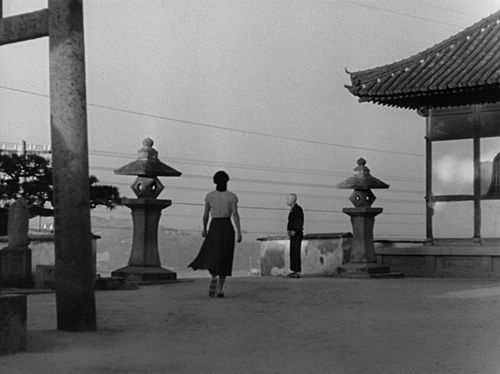
3:16: Conant reads this as a ruse, a parody of a kind of reader who has a certain speculative philosophical inclination, doesn’t he? How does he justify this reading which sees Climacus as mirroring the reader’s confusions – and were it true, what would be the point of Climacus doing that?
PM: Let me start, if I may, by briefly saying something about how important Jim Conant has been for me personally. His support and his own example both played an essential role in my philosophical development. I went to the University of Pittsburgh for graduate school in part to study with him, and it was while taking a course with him that I first began reading Kierkegaard closely. When he moved to the University of Chicago, I continued working with him and he ended up serving as co-supervisor of my dissertation. When early on it became clear that I did not agree with his reading of the Postscript, he remained supportive and encouraged me to work out my own view.
I’ve discussed Conant’s reading in my paper ‘Understanding Kierkegaard’s Johannes Climacus in the Postscript: Mirror of the Reader’s Faults or Socratic Exemplar?’ (Kierkegaard Studies Yearbook, 2007, pp. 424-440). One thing I value about his reading is his discussion of some of the ways that the Postscript is clearly not a standard philosophical treatise. Among other things, he draws attention to its pervasive use of irony and humor, the fact that it is pseudonymous, and the strange way that it ends, with Climacus revoking everything that he has said and argued for in the main body of the text. I think that in drawing attention to these features Conant sets readers a kind of interpretive challenge. Can we come up with an account of the Postscriptthat addresses the philosophical significance of its unusual literary form?
Conant’s own attempt to meet this challenge treats Climacus’ revocation as an indication that what has been developed in the body of the work is not what it appears to be. While it may look as if Climacus is trying to shed light on Christianity and what is involved in becoming a Christian, Conant contends instead that the true aim of the Postscript is ‘not to illuminate the nature of the truth of Christianity but to break the illusion that the task of becoming a Christian is one that can be furthered by means of philosophy’ (‘Must We Mean What We Cannot Say?,’ The Senses of Stanley Cavell, eds. Richard Fleming and Michael Payne, 1989, p. 276). As he sees it, what may look like genuine philosophical activity is better conceived of as a kind of parody of it, addressed to readers who are inclined to evade the practical difficulties of living an ethical or religious life by transforming what are essentially matters of the will into matters of intellect. ‘The philosopher is particularly prone, on this view of him,’ writes Conant, ‘to convert the practical difficulty of living a certain sort of life into the intellectual difficulty of trying to understand how it is one can become a person who leads such a life’ (‘Kierkegaard, Wittgenstein, and Nonsense,’ Pursuits of Reason: Essays in Honor of Stanley Cavell, eds. Ted Cohen, Paul Guyer, and Hilary Putnam, 1993, p. 205). That is, on Conant’s view the Postscript addresses itself to readers who think that by reflecting on Christianity they can make genuine progress in trying to decide whether or not to become a Christian, when in fact their reflection only serves to prevent them ‘from ever arriving at a decisive action and hence from properly embarking on such a life’ (‘Putting Two and Two Together: Kierkegaard, Wittgenstein and the Point of View for Their Work as Authors,’ Philosophy and the Grammar of Religious Belief, eds. Timothy Tessin and Mario von der Ruhr, 1995, p. 311). And the way to help such readers to discover that they possess this alleged tendency to think about living rather than actually living is to have a pseudonym (in this case Climacus) enact this very tendency, serving as a kind of mirror for the reader. As Conant puts it, ‘[t]he aim is to present the reader with a mirror: a portrait of an idealized character in whose features he might recognize himself (and thereby recognize his life as he fantasizes it to be at variance with his life as he leads it)’ (‘Putting Two and Two Together,’ p. 257). The hope is that readers will catch themselves identifying with Climacus’ own alleged tendency to reflect rather than to make a decision or personal commitment, only to have it eventually dawn on them that this entire enterprise is fundamentally confused and rests on the very tendency from which they too suffer: what Conant calls a ‘compulsion to always reflect upon the task of living (a certain sort of life) rather than to attend to the task itself’ (‘Kierkegaard, Wittgenstein, and Nonsense,’ p. 207).
There’s obviously more to Conant’s view than I’ve described here, but this is the basic picture. Apart from recommending that people read his papers to get clearer about his view, I’d also recommend an earlier paper by Henry Allison that Conant draws on in his writings (‘Christianity and Nonsense,’ The Review of Metaphysics, 1967, pp. 432-460). In this paper Allison argues that if the Postscriptis treated as a straightforward philosophical treatise that contributes to ‘religious or existential philosophy, the charge of irrationalism is irrefutable’ (p. 432). He claims that the book’s chief doctrinal claim (that subjectivity is truth) ‘not only leads to a consistent misologism, but also implies the ultimate identification of Christianity and nonsense.’ Allison proposes an alternative reading that takes into account Climacus’ self-proclaimed role as a humorist, arguing that the ‘doctrinal content of the work must be regarded as an ironical jest, which essentially takes the form of a carefully constructed parody’ of Hegel’s Phenomenology of Spirit(pp. 432-433).
3:16: You disagree with this, don’t you? What you read Climacus as doing is enacting an anti-Hegelian philosophical style. Is that right? What are your objections to Conant’s picture?
PM: I definitely disagree with Conant (and Allison for that matter) about the philosophical significance of what Climacus develops in the Postscript. It’s true that he does criticize and frequently make fun of Hegelian speculative philosophy, claiming, as Conant notes, that its practitioners are prone to a kind of absentmindedness and self-forgetfulness. But I think it’s wrong to assimilate Climacus’ own philosophical activity to the Hegelian manner of doing philosophy that is on the receiving end of many of his jokes. What Climacus does, rather, is to discuss (and enact) an alternative manner of doing philosophy, one which he associates closely with Socrates and which he thinks can be practiced without interfering with an individual’s ability to live an ethical or religious life. He characterizes this Socratic conception of philosophy as ‘that simpler philosophy, which is delivered by an existing individual for existing individuals’ (CUP1, 121; SKS7, 116; trans. modified).
One objection I have to Conant’s account concerns how he conceives of Kierkegaard’s pseudonyms and the role he thinks they play in a given pseudonymous work. Historically, there have typically been three ways of approaching Kierkegaard’s writings: (1) one approach ignores Kierkegaard’s use of pseudonyms and his claims that he sometimes employs indirect communication, basically treating Kierkegaard’s texts as straightforward philosophical treatises; (2) a second approach takes the primary function of Kierkegaard’s pseudonyms to be exhibiting confusions that readers may also be prone to—pseudonyms are thus not ends in themselves or at all exemplary (except negatively), but essentially serve as mirrors for readers, allowing them to discover their own limitations; (3) a third approach conceives the pseudonyms to be working together with Kierkegaard, serving, as it were, as his lieutenants in the field; their aim is to reacquaint the age with three interrelated things: what it is to be an individual human being, what it is to encounter a person who knows how to employ the first-personal ‘I,’ and what it is to come into contact with someone who has a fundamental outlook or view of life, whose life, thereby, has a certain character or integrity to it. Conant and Allison take the second approach, together with M. Holmes Hartshorne (Kierkegaard, Godly Deceiver, Columbia University Press, 1990), Stephen Mulhall (‘God’s Plagiarist: The Philosophical Fragments of Johannes Climacus,’ Philosophical Investigations 22, 1999), and others. I take the third approach and am of the view that these latter two ways of approaching Kierkegaard’s texts, with their competing conceptions of what a Kierkegaardian pseudonym is and the role pseudonyms play in a given pseudonymous work, are fundamentally at odds with each other.
I think Conant’s way of conceiving of pseudonyms leads him to be unduly suspicious of Climacus’ own philosophical activity, which leads him in turn to misinterpret what Climacus is actually doing. Because Conant thinks that the Postscript targets readers who are prone to excessive reflection, he is also inclined to be suspicious of Climacus’ reflective activity. If he is meant to serve as a mirror and the behavior that he is supposed to mirror is defective, then it stands to reason that Climacus’ corresponding behavior is also defective, something which Conant thinks is later signaled by Climacus himself when he revokes everything at the end of the work. And once you begin to read the Postscriptor another of Kierkegaard’s pseudonymous works through this lens of suspicion, it becomes very difficult not to find suspicious activity everywhere.
Before saying something further about the distortions that I think can arise when the Postscript is read this way, I first want to address the significance of Climacus’ revocation. Conant attaches a lot of importance to this gesture of Climacus’, suggesting that it calls into question whether there is any genuine philosophical content in what has been developed in the body of the text. He treats the revocation as Climacus’ final, most straightforward way of trying to communicate to his readers that philosophy has no role to play when it comes to deciding whether or not to become a Christian. According to Conant, the upshot of Climacus’ revocation is that readers are left with nothing but themselves and (hopefully) a better understanding of their tendency to reflect and think rather than to act. But, however attractive this understanding of Climacus’ revocation might be, there is virtually no textual evidence to support it.
To understand what revocation signifies for Climacus and why he revokes what he’s developed in the body of the Postscript, it helps to know a bit more about Climacus and the type of person he claims to be. In the Postscript Climacus discusses three basic types of life—the aesthetic life, the ethical life, and the religious life—and ranks them in terms of how developed a person’s subjectivity is. The aesthete ranks lowest, the ethical person comes second, and the religious person is supposed to be the most developed when it comes to being a subject or, we might say, to having an inner life. Climacus calls irony a confinium (a common boundary or border) between the aesthetic and the ethical, and humor a confinium between the ethical and the religious (CUP1, 501-502; SKS7, 455). Accordingly, he ranks the ironist higher than the aesthete, but lower than the ethical person, and he ranks the humorist higher than the ethical person, but lower than the religious person.
Though he is not very forthcoming about himself in Fragments, Climacus is more open in the Postscript, calling himself a humorist. A humorist, as Climacus and Kierkegaard both use the term, is not simply someone who likes to make jokes, but rather someone who has a certain familiarity with the ethical and the religious without being either an ethical person or a religious person. In calling himself a humorist, then, Climacus claims to be, existentially speaking, a highly developed person, someone who can speak with some authority about the ethical and the religious, but who himself falls short of actually being a religious person.
Both the humorist and the religious person have the ability, from their existentially more developed vantage points, of seeing the limitations of the ethical life, something an ethical person may not be capable of. At the same time, there is also a fundamental respect in which these two figures differ. There’s a nice quotation from Wittgenstein which I think helps to bring out this difference: something to the effect of, ‘I am not a religious person but I can’t help seeing things from a religious point of view.’ Kierkegaard’s humorist is similar. He or she sees the world as a religious person does. In particular, Climacus says that the humorist and the religious person both understand the religious significance of resignation, suffering, and guilt. These concepts govern what is and is not valuable in the religious life. Where the humorist and the religious person differ, however, is in whether or not they allow this point of view and its constitutive concepts to shape the general character of the lives they lead. While the religious person gains a life with a religious character, the humorist balks and pulls away, refusing to be personally so changed. In this way the humorist revokes the religious, refusing to allow it to gain a foothold in his or her life. So given the special meaning that Kierkegaard and Climacus both attach to the term ‘humor’ and to what it is to be a humorist, it’s actually not surprising that Climacus revokes what he has developed and argued for in the Postscript. This is precisely what you would expect a humorist to do. But just because the author of the Postscript is a humorist who refuses to be personally changed by what he has written, it doesn’t follow that Kierkegaard wants readers of the Postscript to dismiss all the content that Climacus revokes or not take any of it at face value.
When Climacus first describes the nature of the experiment he’ll be carrying out in the Postscript, he notes that by raising this question in the first person, it will, at least initially, apply to him alone (CUP1, 17; SKS7, 26). But he also adds that ‘if properly presented, it will pertain to everyone else in the same way.’ At the end of the book, in the final appendix, Climacus confirms that he thinks of the content of the book as experimentally applying to him alone. He says that ‘in the isolation of the [experiment], the whole book is about [himself],’ that to ‘have asked’ the question ‘How do I, Johannes Climacus, become a Christian?’ is indeed the ‘content of the book’ (CUP1, 617-618;SKS7, 560). Once the experiment is over, however, and he has stepped out of the role of one who is personally interested in asking the question of how he can become a Christian, it makes sense that, as someone who remains unwilling to commit to living a religious life, his final gesture would be to revoke what he’s developed. That’s what humorists do. Interestingly, Climacus also says that he revokes what he’s done because he doesn’t want readers to appeal to his book or to treat him as an authority. He says anyone who ‘appeals to it has […] misunderstood it’ and suggests that ‘[t]o be an authority is much too burdensome an existence for a humorist’ (CUP1, 618; SKS7, 561). Climacus’ revocation is thus best conceived as an expression of his own personal unwillingness to lead a religious life, as well as an indication that he realizes that this sort of life isn’t one that readers should choose on the basis of someone else’s words or on another person’s authority. This is all compatible, however, with the content of what’s been developed being perfectly sound and something that readers might find to be of value—provided, however, that they choose to incorporate it into their lives of their own volition.
In thinking about how being an overly suspicious reader of the Postscript can lead to certain distortions, I’ve found helpful a discussion by Wayne Booth about difficulties that can arise with detecting irony. He claims that there are ‘two obvious pitfalls in reading irony—not going far enough and going too far’ (A Rhetoric of Irony, University of Chicago Press, 1974, p. 169). While readers who don’t go far enough are in danger of missing the irony altogether (e.g., reading the Postscript as a straightforward philosophical treatise), readers who go too far are in danger of finding irony where there is none, of reading a given text in effect with too much sophistication. Booth claims that in such cases ‘overly ingenious readers sometimes go astray’ in their search for irony; ‘[o]nce they have learned to suspect a given speaker, they are tempted to suspect every statement that he makes’ (p. 185). I think something analogous is going on in Conant’s approach to Climacus. Climacus portrays himself as someone who has all sorts of time on his hands. He lingers, he slows things down, he occasionally even calls himself a ‘loafer,’ and he repeatedly tells his readers that he is in no hurry whatsoever to finish with his reflections about ethical and religious topics, including the guiding question in the Postscript of how to become a Christian. Now if, like Conant, you think that the Postscript is written for readers who compulsively use reflection to put off making the decision of whether or not to become a Christian, then all of Climacus’ loafing, reflective activity can appear comically suspicious. He reflects for several hundred pages and never even comes close to making any such decision himself.

But I don’t think that Conant has correctly identified who the main target of the Postscript is. It doesn’t target readers who are consciously trying to decide whether or not to become a Christian and who think that philosophy can help them to make this decision. Instead it targets readers who are under the illusion that they already are Christians, and who think that being a Christian is not something that requires much effort on their part. At the same time, being reflective by nature and having certain intellectual inclinations, such readers may find themselves drawn to speculative philosophy, and the more they become enamored with the abstract, disinterested form of reflection that this activity involves, the more they may develop a habit of neglecting themselves. This can lead, in turn, to their having no patience for attending to themselves or perhaps to their supposing that they have long since finished with such a task. If this is the kind of reader that the Postscript targets, then Climacus’ loafing behavior ceases to be suspicious at all. It is best understood not as a mirror, but as a corrective to hasty, impatient readers whose chosen manner of doing philosophy can lead them to forget themselves. If such readers are in a hurry, then Climacus will take his time and take on the appearance of a loafer. If such readers imagine that they already are Christians and that being a Christian is easy, then Climacus will try to acquaint them with just how difficult and strenuous it is both to become and to be a Christian.
It’s certainly important that these readers are reflective by inclination and so may be drawn to doing philosophy, but it doesn’t follow that Climacus is trying to help readers to discover that philosophy per se has no place in the actual leading of their ethical or religious lives. Instead I think Climacus means to warn readers about the dangers of doing philosophy as it is commonly practiced by Hegel and his followers, while also pointing them to that alternative, Socratic manner of doing philosophy I mentioned earlier; a way of doing philosophy that enables them to engage in reflection while keeping themselves in view.
Because practitioners of speculative philosophy may imagine that they have already finished with the task of attending to themselves, Climacus suggests that what they are in need of above all is self-restraint. He claims that ‘the task is to exercise restraint, since the temptation is to finish too quickly’ (CUP1, 165; SKS7, 153). In this way Climacus’ loafing behavior takes on a new significance. If speculative philosophers have no patience for attending to themselves and imagine that they have already finished this task, then Climacus’ ability to slow things down, to rethink topics and approach them from new angles, and basically to ‘keep on as long as need be’ is, above all, a mark of his power of self-restraint (CUP1, 181; SKS7, 167). This is something that readers can learn to observe in Climacus’ own behavior in the Postscript. While one of Climacus’ goals is to bring to light what he takes to be the ludicrousness of Hegelian-style philosophy and how its practitioners often wind up neglecting and forgetting themselves, it is not his goal to exhibit this self-forgetfulness himself. His goal is rather to wean his readers from their bad habits of thought while exemplifying for them the kind of self-restraint that is characteristic of this other, more Socratic manner of doing philosophy.
3:16: Although you see Climacus as a Socratic figure you don’t think he proceeds here exactly as Socrates does. How different is his approach from Socrates here – and going back to the earlier question, does he proceed in the same manner as he does in the Fragments and what does this tell us about his conception of philosophy rooted in Greek antiquity?
PM: A recurring theme in the Postscript is how, on Climacus’ view, ancient Greek philosophy (as exemplified by Socrates) is superior to modern philosophy (as exemplified by Hegel). One reason he seems to admire the former is because of its explicit concern with how a person lives. In doing philosophy as the ancient Greeks practiced it, the individual directs his or her attention to self-cultivation and to forming oneself into a particular kind of person. Or, as Climacus puts it, ‘in [ancient] Greece a thinker was not a stunted existing person who produced works of art, but he himself was an existing work of art’ (CUP1, 303; SKS7, 276).
It’s true that while I conceive of Climacus as a Socratic figure, this doesn’t mean he proceeds as Socrates does. In Plato’s dialogues Socrates typically employs a method of questioning and refutation, whereas in his two books Climacus primarily engages his readers through the two literary experiments I’ve been discussing. One thing that he and Socrates seem to have in common is an interest in helping others to discover certain shortcomings they may possess that interfere with their ability to live well. Socrates tends to characterize these shortcomings in terms of a particular kind of ignorance: thinking one knows something one does not know. For someone who is in this condition, it can be difficult to discover that one is ignorant, and reaching the point in a conversation with Socrates where one can acknowledge one’s ignorance is often a significant moral accomplishment.
Climacus also targets readers who might be said to be suffering from this kind of ignorance, but this isn’t normally how he describes them. Instead he suggests that the lives they lead can be characterized, on the one hand, by an excess of knowledge and, on the other hand, by a kind of amnesia concerning the importance of and the difficulties associated with living an ethical or religious life. He claims that ‘[b]ecause of much knowledge people have entirely forgotten what it means to existand what inwardness is’ (CUP1, 242; SKS7, 220). It isn’t immediately clear, however, how knowledge is supposed to be the source of the problem, or what it would mean to have forgotten such seemingly essential aspects of what it is to be human. Perhaps the most natural way to take this claim about knowledge is that people are overwhelmed by so much knowledge that they wind up forgetting some of it (a kind of modern-day information overload). But Climacus seems to have something different in mind. He joins Kierkegaard in distinguishing between aesthetic capacities, which concern objects and require the subject to be disinterested, and ethical and religious capacities, which concern the subject who is exercising these capacities and require one to be interested in oneself and either one’s relations with other human beings or with a divine being (CUP1, 323-324; SKS7, 295). The term ‘aesthetic’ has a much broader connotation in Kierkegaard’s writings than it normally does for us. Aesthetic capacities are held to be appropriate for apprehending a range of things, including pleasure, natural objects, and objects of the intellect (e.g., mathematical objects), as well as objects of beauty and art. Climacus’ basic diagnosis seems to be that people have fallen into the habit of one-sidedly exercising their aesthetic capacities, leading them to neglect themselves and those parts of a person’s nature that involve the use of ethical and religious capacities. Having fallen into the habit of approaching the world in a disinterested fashion, as though it were merely an objective realm to be known, people have lost track of the subjective realm of action and inwardness. A condition of knowing too much, aesthetically speaking, seems to foster a condition in which the ethical and the religious are neglected or, as Climacus puts it, in which the ethical and the religious seem to have been forgotten.
Climacus complicates this picture, however, by seeming to allow that, in a setting where people are awash with (aesthetic) knowledge, these habits of thought can also spill over into ethical and religious realms. It is not simply that, because they are in the habit of approaching things in a disinterested fashion, they have lost sight of what can truly come into view only if it is approached in an interested fashion, but they also seem to become quite knowledgeable about the ethical and the religious even as they fail to make proper use of such knowledge in their individual lives. Climacus maintains with respect to Christianity, for example, that ‘because everyone knows the Christian truth, it has gradually become such a triviality that a primitive impression of it is acquired only with difficulty’ (CUP1, 275; SKS7, 250). Here he relies on a distinction between what might be called mere knowledge of an ethical or religious truth and action-generating knowledge. Of course it might seem that since ethics and religion are inherently practical in nature, it makes no sense to attribute knowledge to someone whose life does not reflect what this person supposedly ‘knows.’ (This is akin to the view often associated with Socrates that virtue is itself a kind of knowledge.) Instead of affirming, however, that such a person must be entirely lacking in knowledge about the ethical and the religious, Climacus maintains that in such cases the individual’s relationship to what he or she knows is such that this knowledge fails to make an appropriate, action-motivating impression on him or her. As Kierkegaard’s Christian pseudonym Anti-Climacus puts it, people may know how to ‘expound’ abstractly about the ethical and the religious even though this knowledge ‘exercises no power’ over their lives (SUD, 90; SKS11, 203). In such a situation, according to Climacus, what a person knows is best characterized as something that he or she knows ‘by rote.’ He thinks, furthermore, that the best way to engage such a person is via the sorts of experiments that he employs in his two books. He claims that if a person ‘knows everything but knows it by rote, the form of the [experiment] is a good exploratory means; in this form, one even tells him what he knows, but he does not recognize it’ (CUP1, 264; SKS7, 240).
Climacus seems to think that modern speculative philosophy is a striking example of this larger tendency of the age. While he does not object to abstract philosophical reflection per se, since it too has its appropriate applications and objects (CUP1, 55; SKS7, 59), he does draw attention to how the proper exercise of the speculative philosopher’s aesthetic capacities leads him to ‘lose himself in objectivity, disappear from himself’ (CUP1, 56; SKS7, 60). This may be appropriate when one seeks to illuminate and comprehend a given object, but it can have particular consequences for ethics and religion since one ‘removes the very locus of the decision: the existing subject’ (CUP1, 295; SKS7, 269).
Climacus says that when people are in this condition what they lack above all is a kind of passion. With respect to Christianity in particular, he says that even as people seem to know a lot about Christianity, what they know does not personally move them. It’s as if their knowledge of Christianity were a clinical, disinterested form of knowledge where, as Climacus puts it, ‘there is neither a suggestion of offense nor a place for faith’ (PF, 94; SKS4, 291). Christianity in effect leaves them cold and doesn’t personally affect them. Thus we might say that part of what it is like for Climacus’ readers to be under the illusion that they already are Christians is for them to have acquired a certain amount of knowledge about Christianity (obtained through such activities as Sunday school, confirmation, church services, etc.) while remaining personally disinterested or unmoved by its teachings. Climacus wants to help his readers move from this apathetic condition to one in which a passionate response by them becomes possible, though he also makes clear that if they gain this sort of responsiveness there’s no guarantee that they will respond with the passion of faith and become genuine Christians: they might also respond with what he calls the passion of offense, in which one passionately rejects Christianity. He says that this is the characteristic response of the devout Jew (who finds Christianity blasphemous) or the ancient Greek philosopher (who finds it ludicrous). But regardless of whether they respond with faith or offense, what they will gain is an increased awareness of Christianity and the significance that it can have for an individual (PF, 93; SKS4, 291; PV, 50; SKS16, 32). If Climacus succeeds in helping his readers to become personally interested in this way, he thinks they will have made a small change for the better, perhaps leading them to acknowledge that they haven’t been living the Christian lives that they imagined.
Climacus’ attempt to evoke a passionate response from his readers can be compared to the role that a love of wisdom plays in Socrates’ interactions with his interlocutors. Socrates seemed to believe that the natural consequence of becoming intensely aware of the embarrassing depth of one’s own ignorance is to become intensely desirous of acquiring the most important kind of knowledge, that is, to become a person who is passionate about wisdom (philosophos).
To counteract his readers’ present apathetic condition, Climacus has two goals. First, he hopes to help his readers gain a greater responsiveness to what they may presently know only by rote. Second, he hopes to redirect their intellectual energies away from the speculative/Hegelian manner of doing philosophy towards the Socratic way of doing philosophy that I’ve been discussing, illustrating for them in the process how the practice of this form of philosophy involves self-restraint and attending to oneself. In terms of his two books, I would say that Philosophical Fragments focuses on the first goal while the Postscript’s primary focus is the second goal.
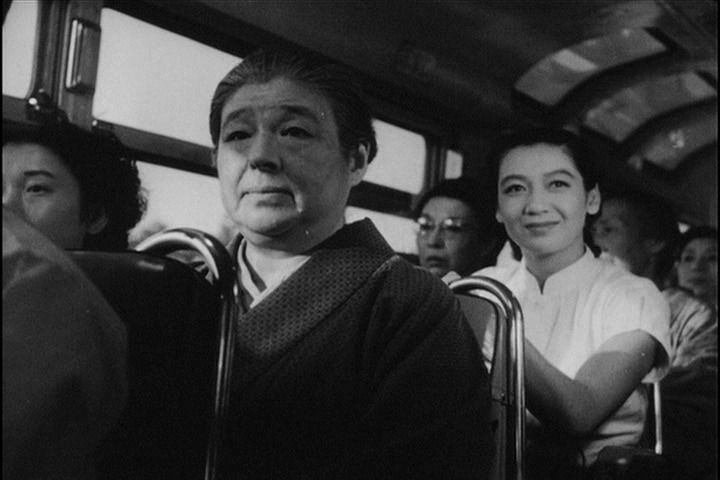
3:16: One issue you’ve isolated for treatment in the Postscriptis the issue of death. You see the Postscript as a therapeutic book facing the existence-problem of dying. Can you say something about this, in particular how we are to make sense of the seemingly paradoxical statement that ‘to think about death one must think it “into every moment” of one’s life’?
PM: In Plato’s Phaedo, Socrates says that one way to conceive of philosophy is as a kind of training for death, where the individual tries to purify his or her soul and keep it as separate as possible from the body while he or she is alive, in preparation for that time when death finally separates the soul from the body and the soul perhaps makes its way to Hades. In a book like the Postscript, whose main question concerns how to become a Christian, you might expect that a discussion of death would also be concerned with what happens to us after we die, but that is not Climacus’ focus. His concern is rather with the significance that death has for people while they are alive. Regardless of what happens after death, what does it mean for a particular person that he or she is mortal? What does it mean that though he or she exists now, this specific life will one day come to an end? Climacus’ basic view is that there is more to these questions than most people appreciate. He thinks people tend either never to raise these questions at all, or to raise them only once in a rare while, perhaps at some particularly meaningful moment when they are most struck by all that there is and so by all that will be lost. How he gets from this claim to the further claim that if you are really going to think about death then you must think it into every moment of your life is a bit complicated. It might seem to make sense as some sort of exaggerated way of trying to draw people’s attention to how far they presently are from adequately thinking about what it means for them personally that one day they will die, but as a practical injunction it’s not clear what it could possibly mean. It certainly doesn’t mean that you must continually keep having the conscious thought ‘I am going to die’ or something like this running through your head at every moment of your life.

Climacus identifies ‘what it means to die’ as a paradigmatic example of what he calls an ‘existence-problem’; other examples that he considers include ‘what it means to pray,’ ‘what it means to be immortal,’ ‘what it means to thank God,’ ‘what it means to marry,’ and above all the problem of how an eternal happiness can be built on historical knowledge, that is, ‘what it means to become a Christian’ (CUP1, 352; SKS7, 322). Existence-problems pertain to ethical and religious matters, and Climacus readily admits that for the person who is in the habit of thinking about the narratives of world history these problems may appear, comparatively speaking, insignificant or overly ‘simple’ in nature (CUP1, 160; SKS7, 148). His aim seems to be to impress upon his readers how these seemingly simple problems become much more difficult once they are conceived of in relation to an individual’s own life. Since existence-problems concern ethics and religion, part of what makes them difficult stems from their being inherently practical and action-guiding, consisting of ‘not only a knowing’ but ‘also a doing that is related to a knowing’ (CUP1, 160; SKS7, 149). As Climacus sees it, existence-problems are such that if they are approached in the right way, then they should occupy and concern an individual at every moment for the whole of life and should, accordingly, provide the philosophically-inclined person with topics to think through that will also be engaging for the whole of life.
In the chapter in the Postscript in which he considers death, Climacus’ overall discussion concerns what he takes to be a tendency in his day for people to neglect what he calls the task of ‘becoming subjective’ or becoming a proper subject or self, where the emphasis is on an individual’s ability to cultivate or transform himself or herself. He suggests that what may explain this neglect is people’s having fallen under the influence of a Hegelian concern with world history, leading them, on his view, to attach less importance to being an individual person. In fact, he thinks the particular ‘immorality of [his] age is perhaps not lust and pleasure and sensuality, but rather a pantheistic, debauched contempt for individual human beings’ (CUP1, 355; SKS7, 324). He claims that ‘people want to delude themselves world-historically in the totality; no one wants to be an individual existing human being.’ In response, Climacus will set before readers the task of becoming a subject and the existence-problems that they may encounter in the process of trying to fulfill this task.
Climacus begins his discussion of the existence-problem of what it means to die by claiming to know about this topic ‘what people [generally] know’ (CUP1, 165; SKS 7, 153). He says he knows some of the things that can cause death; knows that people have different attitudes about suicide; knows death can sometimes appear comic, other times tragic; and knows what the clergy usually say about death at funerals. In cataloguing these things, Climacus invites his readers to find his knowledge to be pretty comprehensive. Yet he says that ‘despite this almost extraordinary knowledge,’ he does not ‘consider death as something that [he has] understood’ (CUP1, 166; SKS7, 154). Rather than moving on to study world history, he suggests he ‘had better think about this, lest existence mock [him] for having become so erudite that [he] had forgotten to understand what sometime will happen to [him] and will happen to every human being.’ In fact, he thinks there is an urgency to think about this since death might be so ‘devious as to come tomorrow!’ These sorts of reflections seem designed to bring readers to a halt, perhaps leading them to question whether their own knowledge of death is adequate and reminding them that the time they have to understand death is limited.
Even if Climacus’ various considerations do give his readers pause, he still needs to say more about what is underwriting his claim about not understanding death. What more is there besides the everyday knowledge that he claims to possess? Why isn’t this general knowledge about death adequate? Climacus’ main thought seems to be that when it comes to understanding death, there is something above and beyond this general knowledge, something that pertains to what it means to die for a given individual that we might call inherently first-personal in nature. In my own case, for example, ‘my dying is by no means something in general’ for me, though Climacus agrees that an individual’s dying could very well have this quality of being ‘something in general’ for others (CUP1, 167; SKS7, 155). Neither ‘am I for myself some such thing in general,’ though Climacus again agrees that an individual could very well be ‘some such thing in general’ for others. By considering the possibility that either an individual’s dying or that person himself or herself might be ‘some such thing in general’ for other people, Climacus makes clear that he is not denying that part of what it means to die can be straightforwardly characterized in general terms and so also understood in general. His claim is that with respect to oneself, grasping what can be grasped in general about death will not suffice for truly coming to grips with the existence-problem of what it means to die. An individual’s own dying, on Climacus’ view, does not have an ‘in general’ quality for that person; instead, he seems to think that each person’s own dying has a particular character that accordingly requires a non-general, first-personal understanding. In my own case, what is crucial is that the dying in question is mine, and that the person in question who will die is me. It’s this fact that Climacus suggests we aren’t adequately struck by and that points up the limits of our understanding of death.
3:16: So is Climacus warning us about adopting the ‘world-historical perspective’ – something with a dreadfully apposite ring to it at the moment with so many people seemingly doing terrible things in the name of such an unconstrained perspective? Is ‘mourning over oneself’ part of what Climacus is recommending as an alternative?
PM: Yes and no. I do think that Climacus is offering his readers a kind of warning. While attending to world history may shed light on the development of human culture and the human race as a whole, he maintains that this requires a philosophical outlook that is fundamentally directed at the past and what is finished or complete. By his lights, such an outlook does not provide individuals with resources for trying to understand themselves in the midst of their unfolding, unfinished lives or help them to determine future actions. He maintains, for example, that ‘a Hegelian cannot possibly understand himself with the aid of his philosophy; he can understand only what is past, is finished, but a person who is still living is not dead and gone’ (CUP1, 307; SKS7, 280). Climacus seems to think that the real danger of habitually adopting the world-historical perspective is that this can lead to the condition of absentmindedness that I discussed earlier and, thereby, lead to individuals’ losing track of themselves as practical agents.
It is in response to this tendency to neglect the task of becoming a subject that Climacus speaks of mourning over himself, though I think his words clearly are colored with a certain irony. In the face of people’s interest in world history, Climacus Socratically presents himself as someone who can’t help ‘attending a little’ to himself. While everyone else may have the time and the ability to devote themselves to the study of world history, he maintains that he simply is not up to the task. Instead he feels ‘obliged many a time to sit at home and mourn over [himself]’ and says he has ‘seen the necessity of attending a little to [himself]’ (CUP1, 161; SKS7, 149). By playing the part of a loafing Socratic figure who is not in a hurry to move on to the study of world history, Climacus thereby casts himself as someone who often has occasion by regularly attending to himself to notice tasks that he alleges are ‘sufficient for a whole human life.’ His aim seems to be to try to convince his readers that the task of becoming a subject and attending to themselves is actually of greater significance (and difficulty) than they may imagine. Furthermore, given their intellectual inclinations, it also appears to be his aim to try to convince his readers not only that such a task by its very nature requires a lifelong commitment, but that in the process of carrying it out, existence-problems can arise that may also satisfy his readers’ intellectual appetites—without, however, leading to the condition of self-forgetfulness and absentmindedness that he alleges results from engaging in Hegelian-style speculative philosophy.
3:16: What does Climacus mean when he says that an individual person is ‘a human being in general’? As you say, this sounds like a riddle.
PM: As Climacus characterizes the personal dimension of understanding death, concerning a given person’s relationship to his or her own dying, he also draws attention to what might explain why his readers’ own deaths may not have fully registered with them. In response to those who think, for example, that the uncertainty of death can be understood in general, he claims that ‘this uncertainty cannot possibly be understood in general unless I am also such a human being in general’ (CUP1, 167; SKS7, 154; trans. modified). I think Climacus expects us to be puzzled by this idea of an individual person’s being ‘a human being in general.’ And it’s clear that he means this phrase as a form of criticism. What would it take to be a human being in general? According to Climacus, this is ‘something only absentminded people are, for example, Soldin the bookseller.’ Insofar as one might be described in these terms, one falls short of being a particular, individual human being. After he reports that ‘when he [Soldin] was going to get up in the morning, he was not aware that he was dead,’ we are surely meant to laugh at the extent of Soldin’s absentmindedness, as it continues to accompany him even after he has died (CUP1, 167; SKS7, 155). The warning for Climacus’ readers, however, is that one can become alienated from oneself in this way, distracted or absent from oneself, so that being mortal and all that this involves simply does not register. In such a case, one’s understanding of oneself, if it can be called an understanding at all, is a conception of oneself as a nonparticular, ‘some such thing in general’ human being. But this hardly amounts to being human at all, and, according to Climacus, what is ‘most embarrassing of all’ about being on ‘such bad terms with oneself’ is when one remains ‘ignorant’ of this condition (CUP1, 167; SKS7, 155; trans. modified). I think this ignorance is precisely what Climacus is Socratically targeting in his readers.
3:16: The world seems full of horrors at the moment. As a philosopher would you say that Kierkegaard can still speak to the contemporary world and what would you say to those who have attacked philosophy (and the humanities generally) as being irrelevant?
PM: One way that I think Kierkegaard can still speak to the contemporary world is through his wit and sense of humor. Kierkegaard is, to my mind, one of the funniest philosophers ever. I think his concerns and writings still bear directly on much of what seems to occupy people in the present day. It seems to me that his biggest worry, that human subjectivity is not valued as it should be or cultivated adequately by people, still holds. It is true that it may be much more common now than in Kierkegaard’s day for people to focus on themselves as individuals and to use the first person, but this may just be a new way of evading the difficult task of becoming an ethical or religious person. We talk about ourselves more than ever, thanks to social media, but that doesn’t mean we’ve developed our human subjectivity. The selves with which we’re so absorbed can be pretty superficial.
While it is hard not to be dismissive of claims that philosophy and the humanities are no longer relevant, I think it’s worth reflecting on what these claims say about our age, about the sort of anxieties and economic insecurities that may be leading people to make such claims. What would I say to them? I suppose I would begin with what they actually say, and then ask them questions so that I could get clear about what exactly they take to be the qualities of philosophy or the humanities that strike them as no longer relevant. And then I would ask more questions, trying to make sure that they felt understood by me, even if some of what they think may turn out to be false or confused in some way. I think it would be an interesting conversation to have.
3:16: And for the readers here at 3:16, are there five books that you could recommend to us that will take us further into your philosophical world?
PM: Thanks very much for inviting me to do this and for posing such challenging questions. I’ve really enjoyed our conversation. I want to thank David Berger and Bridget Clarke for their helpful feedback on my responses.
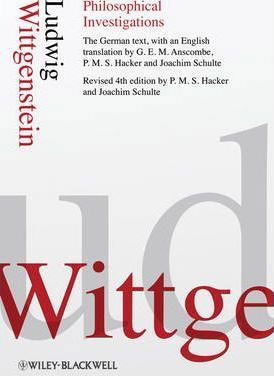
Ludwig Wittgenstein, Philosophische Untersuchungen ( Philosophical Investigations). I’d been considering doing graduate work in cognitive science until I discovered Wittgenstein and never looked back. During the three years I spent studying at Oxford, the Investigations was my constant companion. I was struck most by Wittgenstein’s remarks on philosophy and by his suggestion that there was an analogy between how he practiced philosophy and the methods employed in psychoanalysis. Early on I was impressed by Wittgenstein’s insistence that philosophy ought to inform how a person lives. I remember reading a letter he once wrote to Norman Malcolm in which he said, ‘What is the use of studying philosophy if all that it does for you is to enable you to talk with some plausibility about some abstruse questions of logic, etc., and it does not improve your thinking about the important questions of everyday life?’
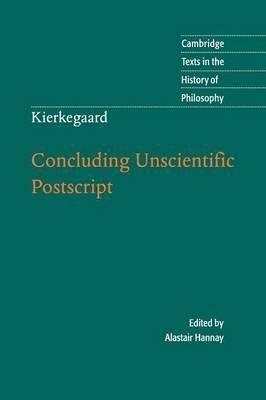
Søren Kierkegaard (Johannes Climacus), Afsluttende uvidenskabelig Efterskrift (Concluding Unscientific Postscript). I first discovered this book as an undergraduate at a used bookstore in Portland, Oregon. I had no idea who Kierkegaard was or what this book was about. The title caught my eye and the elaborate table of contents captivated me enough that I decided to buy it. I didn’t actually begin reading it until much later, when I was in graduate school. Little did I know how much of my life I would spend reading and thinking about this remarkable book.
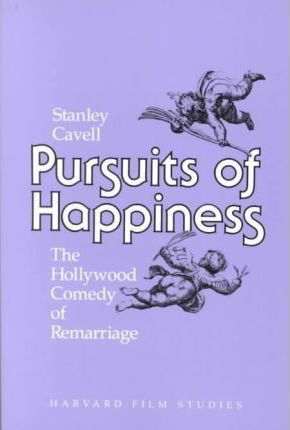
Stanley Cavell, Pursuits of Happiness: The Hollywood Comedy of Remarriage. Cavell got me to appreciate that it is a philosophical question whether something is (or is not) philosophy. In addition to his work on Wittgenstein, Kierkegaard, and Thoreau, I especially value what he has written about film. Pursuits of Happiness was the first Cavell book on film I ever read and is the one I keep returning to. If you are a fan of Cary Grant, I would recommend Cavell’s chapter on The Philadelphia Story.

Henry David Thoreau, Walden. Walden is a book I read before I had ever taken a philosophy class and a book I’ve repeatedly returned to over the years. Like Kierkegaard and Nietzsche, Thoreau reminds us of some of the ways that philosophy can inform and shape our lives. In a chapter of Walden called ‘Baker Farm,’ he describes a conversation he once had with a man named John Field: ‘I purposely talked to him as if he were a philosopher, or desired to be one.’ Perhaps each one of us is John Field.

Jane Austen, Complete Works. In Austen’s novels I am repeatedly struck by the power of self-deception and the value of self-knowledge, by the importance of conversation and of a developed moral sensibility, and by Austen’s eye for self-importance and the delight she takes in the ridiculous. I love all six of her books and read them every year. If I had to choose one, it would be Mansfield Park, the story of dear Fanny Price, my favorite Austen heroine.
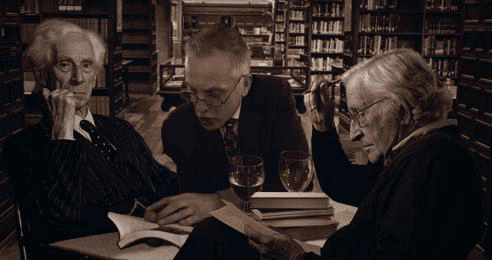
ABOUT THE INTERVIEWER
Richard Marshall is biding his time.
Buy his new book here or his first book here to keep him biding!